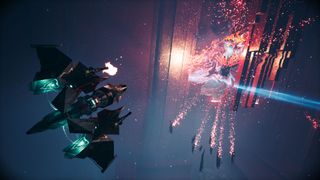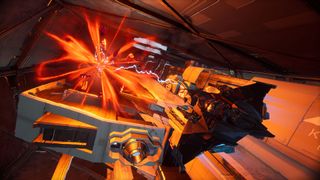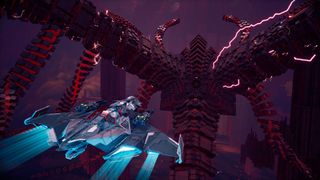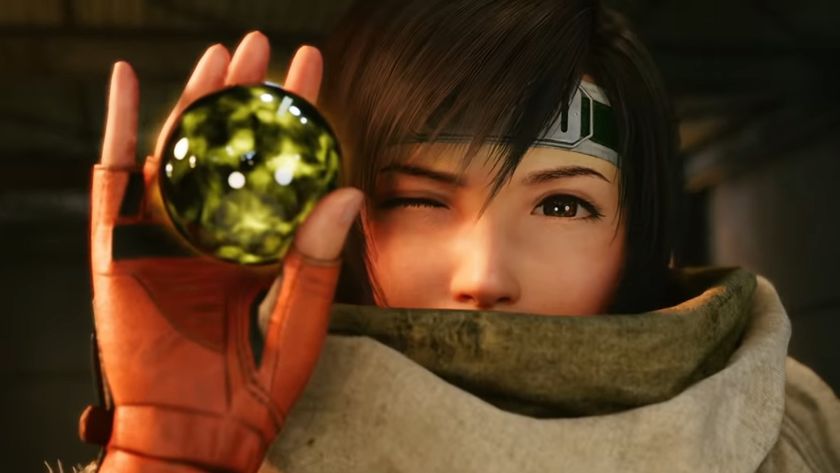12DOVE Verdict
Not everything works well in Chorus, but its inventive, hectic space shootouts deserve to have their praises sung
Pros
- +
Great ship designs and epic space battles
- +
Ship control is quick and precise
- +
Special powers add depth
Cons
- -
Bland story that takes itself too seriously
- -
A couple of horrendous boss fights
Why you can trust 12DOVE
Chorus makes me wonder why there aren't more games like it. Other than a few Star Wars branded efforts and the classic Star Foxes, I can't recall many notable single-player 3D outer space shooters, yet it seems like such an obvious choice for a medium that otherwise gorges on sci-fi and explosions. How strange that an open-world game about flying around killing stuff might be considered refreshing, but here we are. Thankfully, Chorus does a solid job and proves there's life in the genre yet.
Technically, I suppose, it's not open-world because it doesn't have a world, only miles of space, clusters of asteroids, and great metal constructions floating in the void. Nor is it worth exploring much without some idea where you're heading, since, well, a lot of it is empty. It's better to simply sub-light drive between missions, maybe pick up a distress signal on the way, while taking in the view. Indeed, given the limited scope of environments, Chorus is surprisingly colourful, with looming planets and distant stars casting light through the rocks and debris from past wars.
Next to all these giant natural and human-made wonders, your own ship feels insignificant, although of course it's anything but. The pilot of this one-seater triangular jet, Nara, has special powers, you see, and is intent on using them to destroy a genocidal cult called the Circle, which used to count her as one of its most prestigious members. After blowing up an entire planet on their command, she had a crisis of conscience, and now she's helping the resistance to resist.
Do a barrel roll


Release date: December 3, 2021
Platforms: PS5, PS4, PC, Xbox One, Xbox Series X
Developer: FishLabs
Publisher: Deep Silver
Early on, you'll be using Nara's super senses to track down energy capsules, or machine-gunning the occasional pirate. It's a slower start than necessary to let you bed in with the game's controls. True, the setup is slightly strange, almost like an FPS. With steering attributed to the right stick, propelling forward, slowing down, and barrel rolling with the left, but I was slipping my way between asteroids in no time. It helps that you can turn sharply or even quickly stop dead when you're about to hit something.
I really began to understand how precise this system can be when I reached my first sizeable battle against the Circle, fighting to defend 'the Enclave' – the resistance HQ in the game's opening sector. This structure, a long dangling spire encircled by huge metal rings, is perfect for weaving dogfights, looping around its protrusions (and sometimes, admittedly, bouncing off them) in pursuit of speedy cult 'raven' fighters. It encourages you to squeeze through tight spaces even while boosting, trusting in your agility, and sets the tone for bigger skirmishes to come.
The Enclave sequence also introduces one of the game's neatest features – 'psychic totems'. These limpet-like missiles attach themselves to resistance ships and stations, taking control of the crew and forcing them to turn their weapons against you until you blast out the parasitical object. A devious touch which only gets more devious when they start latching on to the inner workings of allied vessels, forcing you to fly inside to take them out.
You read that right. The best thing about the design of the larger ships in Chorus is that they're full of entryways and passages that lead to core components. So if you're up against one of the Circle's grandest specimens, such as a Wraith, you first take out its shield generators then fly inside to the exposed reactor, finishing it off then exiting before the whole thing rips itself to pieces. It's an inspired idea that sees you stripping these imposing bullies down bit by bit on multiple flybys, before tearing through their cavities.
Know your rites

Chorus works especially well when you're working on a behemoth like this, or when you're flanked by squads of buzzing fighters, dipping and climbing to get behind them, or trying to crack a tough little nut that's laying streams of space mines or hassling you with homing lasers. It conjures the feel of a good Star Wars battle scene, complete with roaring jets, pounding lasers, and radio chatter. It also continues to demand even greater daring and dynamism each time Nara reawakens another of her special powers, or 'rites', after visits to alien temples.
The Drift rite, for example, lets you perform sweeping turns while facing your target, while the Star rite lets you charge directly into foes with impunity. One move, where you effectively teleport right behind an enemy in your vicinity, almost feels like cheating, but it's an essential time saver in the more hectic battles. Juggling these and your three weapons – gatling gun, laser, and missiles (which can be upgraded, along with your defence systems) – is essential to efficiently bore through armour and shields.
May the flaws be with you

Not everything in Chorus is so well balanced or executed, however. Unsurprisingly given its open-world structure, it has to find ways to inject variety into proceedings. In some cases that's fine – missions where you have to protect a larger allied vessel, chase a target through an asteroid field, or hop into a tank-like ship with feisty cannons add extra spice. But there's a lot of downtime as well, particularly in side quests, collecting salvage or investigating 'memories', for example, while the temple missions involve a lot of slow crawls through narrow passageways.
The worst comes in the later stages of the game, though, on a number of occasions when conventional spacecraft battles are substituted for encounters with more surreal entities. The biggest offenders here arrive at the climaxes to the middle and final acts, serving up the most confusing, bizarrely difficult, and pointlessly long boss fights I've played in years. I especially can't stress enough how monumentally misjudged the last boss is, as if it's designed to drain all the fun out of the game's precision acrobatic flying by turning it into an arduous, tedious endurance test.

There are plenty of minor frustrations, too, which tend to come from the game failing to show or tell you clearly what it wants. Often, you're relying on conversations between Nara and her ship's AI to direct you, but the script is so saturated in sci-fi jargon it can take a minute to interpret – in which time you might be shot down or lose the enemy you're supposed to be tracking. On a few occasions, I got instantly killed when a new threat appeared because I happened to be hovering near its spawn point. And while you can put these things down to experience and avoid them next time, some loose checkpointing means you might have to redo the previous scene first.
This also means you hear chunks of dialogue repeat a lot, and that's not ideal either, not least because it isn't very interesting the first time around. Chorus makes a big deal of its story, but it's at best a very ordinary sci-fi saga, which helps to drive events along by, say, presenting you with refugees to rescue or families to reunite. The larger scale world-ending narrative, however, is very flat, with faceless (literally – that's what they're called) villains and loads of mystic mumbo-jumbo that takes itself far too seriously.
Still, if it all feels a little B-movie, it's worth remembering that Chorus isn't some huge AAA project (and has a moderate price of entry to match). Some of the bigger frustrations aside, the absence of a little polish and sophistication is forgivable, especially since the core action is as exhilarating as I could have hoped. If we aren't going to see any bigger budget games of this type, Chorus is a worthy attempt to fill the niche.
Chorus was reviewed on PS5, with code provided by the publisher.
Jon Bailes is a freelance games critic, author and social theorist. After completing a PhD in European Studies, he first wrote about games in his book Ideology and the Virtual City, and has since gone on to write features, reviews, and analysis for Edge, Washington Post, Wired, The Guardian, and many other publications. His gaming tastes were forged by old arcade games such as R-Type and classic JRPGs like Phantasy Star. These days he’s especially interested in games that tell stories in interesting ways, from Dark Souls to Celeste, or anything that offers something a little different.

Final Fantasy 7 Remake and Rebirth battle director says combining everything he learned on Monster Hunter: World with Square Enix's technology and unique skills created a "chemical reaction"

"Minutes after Palworld released," Pocketpair was already getting game pitches from "some really big names" before it even set up its own publisher: "No one has money at the moment"












